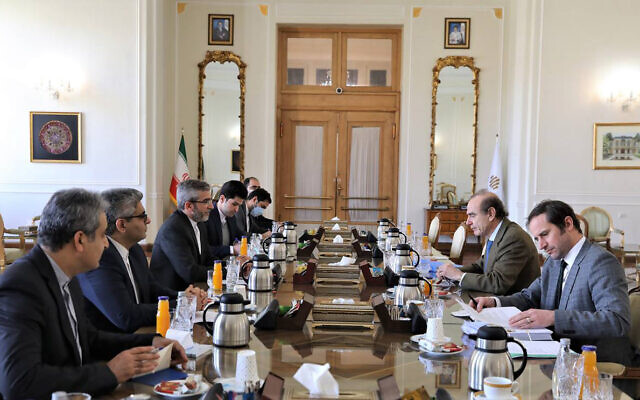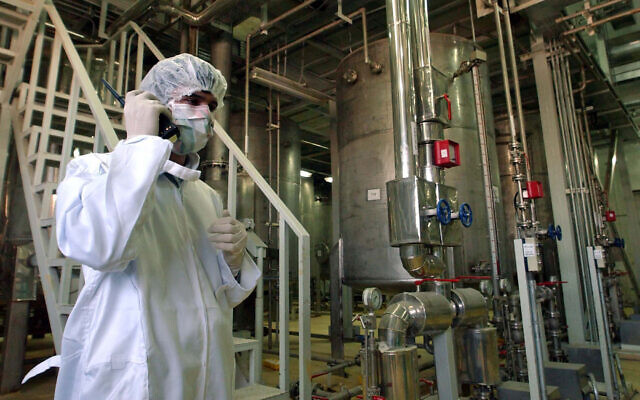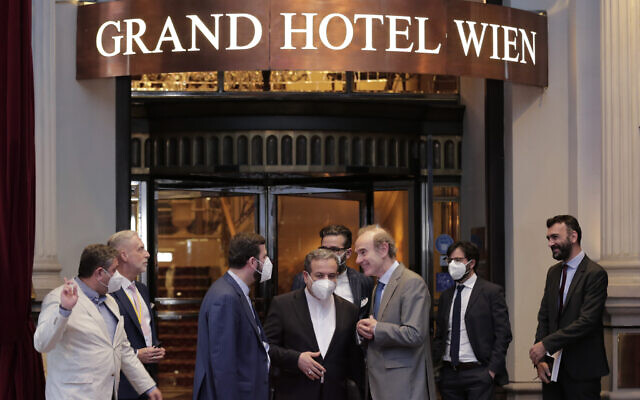Top official speaking to ToI defends refusal to walk away from talks, even as Iran continues to expand its nuclear program; notes US has intensified economic, diplomatic pressure

WASHINGTON — The Biden administration has “lost nothing” by remaining at the negotiation table to revive the Iran nuclear deal, even as Tehran continues to simultaneously expand its nuclear program, a senior US official told The Times of Israel last week, noting that Washington has not ceased imposing sanctions targeting the Islamic Republic even as it pursues a diplomatic resolution.
The senior official rejected calls from Republicans and an increasing number of hawkish Democrats for the US to walk away from talks to resurrect the 2015 multilateral accord known as the Joint Comprehensive Plan of Action; given that Iran’s breakout period — the amount of time it will take for it to amass enough fissile material for a nuclear weapon — has shrunk from roughly one year when the deal was signed to current estimates of just several weeks.
Former US president Donald Trump withdrew from the JCPOA in 2018 and enacted a significant sanctions regime against Tehran, which responded by rapidly increasing its nuclear activity. Last year, Iran announced that it was enriching uranium to 60 percent purity, well above the 20% level it had reached before the nuclear deal was signed. It has held off on enriching to nuclear weapons-grade level 90%, which would likely spark a massive international response.
The Biden administration has sought to negotiate a joint US-Iran return to compliance with the JCPOA, which traded curbs on Iran’s nuclear program in exchange for sanctions relief for Tehran. The sides have been intermittently engaged in indirect talks for well over a year and while neither has broadcast any particular optimism, they did agree on Wednesday to return negotiators to Vienna for talks that haven’t taken place there since March.
But while the administration offers economic reprieve if Iran agrees to abide by the original deal, it has intensified sanctions against Tehran in the interim.
On Monday, the US Treasury Department announced sanctions against a United Arab Emirates-based firm and several Asian companies for facilitating the illicit sale of millions of dollars worth of Iranian oil for shipment to East Asia.

It announced similar sanctions targeting Iran’s oil sector less than a month earlier.
“We have not been waiting to see if we could reach a deal; we have been acting,” the senior administration official said, speaking on condition of anonymity.
“Iran is at the table, even as it expands its nuclear program. We are at the table, even as we enforce and tighten our sanctions and diplomatic pressure,” the official continued. “So we have lost nothing by keeping the door open to a diplomatic settlement, which remains our preferred option.”
The official acknowledged Israel’s opposition to those efforts. Even through changes in leadership over the past several years, Jerusalem has remained in opposition to reviving the JCPOA and argues that world powers should negotiate a “longer and stronger” agreement that also addresses Iran’s ballistic missile program and use of proxies throughout the region. Iran has rejected such a deal out of hand, while the Biden administration maintains that reaching an improved agreement will be impossible unless it first returns to the original accord, helping deescalate tensions.
“It’s not a minor difference,” they acknowledged on the contrasting Israeli and American approaches. “What we’ve made clear, however, and we are confident the Israeli government agrees, is that what unites us far outweighs what divides us on this issue.”

“Whether or not we reach an agreement with Iran on the JCPOA, we are determined to work closely with Israel on countering Iran’s destabilizing activities.”
In the past, US officials placed a timeline regarding how much longer they’ll be willing to remain at the negotiation table with Iran. In December, that deadline was placed at March, with some Biden officials arguing that by then, the deal would no longer be worth returning to given Iran’s progress toward nuclear capabilities.
In recent months though, Washington has ceased making ultimatums that could tie its hands in the future.
“Right now, it is the unanimous view of the national security leadership, based on the assessments of the intelligence community and our nuclear experts, that the non-proliferation benefits of returning to the deal would be worth the sanctions relief we’d be providing,” the senior administration official said.
As reported by The Times of Israel
